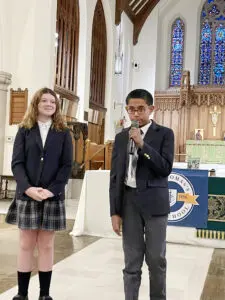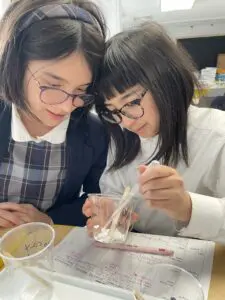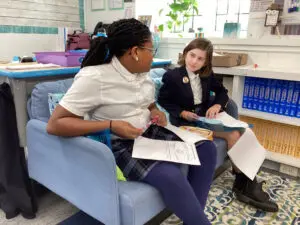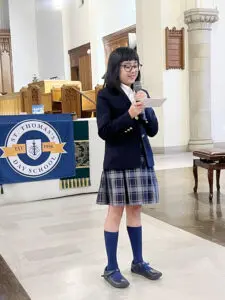 Transitioning to the Upper School (Grades 4-6) is considered a rite of passage at St. Thomas’s Day School, providing students with new responsibilities, expectations, and opportunities. Increased academic rigor, additional leadership roles, and overnight learning opportunities are just a few benefits of moving into the upper grades. Students develop autonomy and ownership over their learning by engaging in student-driven projects and activities that inspire innovation, problem-solving, and critical thinking skills. Study skills, organizational skills, and independence are also emphasized.
Transitioning to the Upper School (Grades 4-6) is considered a rite of passage at St. Thomas’s Day School, providing students with new responsibilities, expectations, and opportunities. Increased academic rigor, additional leadership roles, and overnight learning opportunities are just a few benefits of moving into the upper grades. Students develop autonomy and ownership over their learning by engaging in student-driven projects and activities that inspire innovation, problem-solving, and critical thinking skills. Study skills, organizational skills, and independence are also emphasized.
Stepping Up
Integrated Learning
 St. Thomas’s Day School embraces an integrated learning approach, blending traditional skills and knowledge with experiential learning and hands-on experimentation. Academic content is explored in the classroom and in special classes, which include library, science, technology, physical education, religious studies, and Spanish. Students also participate in a well-developed performing arts program, which allows them to express themselves and demonstrate learning through drama, dance, music, and art. Field trips and educational excursions further support the learning in the classroom by providing hands-on experiences and exposure to outside resources.
St. Thomas’s Day School embraces an integrated learning approach, blending traditional skills and knowledge with experiential learning and hands-on experimentation. Academic content is explored in the classroom and in special classes, which include library, science, technology, physical education, religious studies, and Spanish. Students also participate in a well-developed performing arts program, which allows them to express themselves and demonstrate learning through drama, dance, music, and art. Field trips and educational excursions further support the learning in the classroom by providing hands-on experiences and exposure to outside resources.
The Inquiry Process
 Inquiry-based learning is woven through the upper school curriculum at St. Thomas’s. Students are taught to question the world around them in pursuit of knowledge, clarity, and understanding. In their search for answers, students gather information from multiple sources and perspectives. They are encouraged to make connections, generate ideas, and form opinions using evidence from their search to support their thinking. Findings are shared creatively with classmates, peers, and/or the school community.
Inquiry-based learning is woven through the upper school curriculum at St. Thomas’s. Students are taught to question the world around them in pursuit of knowledge, clarity, and understanding. In their search for answers, students gather information from multiple sources and perspectives. They are encouraged to make connections, generate ideas, and form opinions using evidence from their search to support their thinking. Findings are shared creatively with classmates, peers, and/or the school community.
Leadership
 Leadership skills are directly taught and reinforced regularly at St. Thomas’s Day School through everyday experiences, such as collaborative projects, presentations, debates, and performances. Students are taught how to be leaders and then immersed in experiences that provide practice using leadership skills. Each year, expectations are increased slightly, nudging students towards increasing levels of independence and responsibility.
Leadership skills are directly taught and reinforced regularly at St. Thomas’s Day School through everyday experiences, such as collaborative projects, presentations, debates, and performances. Students are taught how to be leaders and then immersed in experiences that provide practice using leadership skills. Each year, expectations are increased slightly, nudging students towards increasing levels of independence and responsibility.
Drama classes and Morning Gathering provide opportunities for students to learn and practice public speaking. Direct instruction on poise and presentation, including voice projection, eye contact, tone of voice, and confidence, provides students with the tools needed to participate in yearly class plays and performances. Students get additional practice in public speaking when they assume roles in Morning Gathering. They practice being in front of a crowd, speaking to an audience, and communicating ideas.
The social studies program promotes critical thinking skills, which are also essential for strong leadership. Each grade has an essential question and three themes that guide the thinking for the year. These questions and themes build on one another, developing skills at each level that promote leadership and help students express their ideas effectively. Fourth graders learn about analyzing stories and historical events from multiple perspectives. Fifth graders explore agency and learn how people have demonstrated agency throughout history. Sixth graders examine how conflict, a universal problem throughout time and across the world, has historically led to change. Students end their educational experience at St. Thomas’s Day School by learning about youth leaders and thinking about how they, as individuals, can make an impact on the world.
Making the World a Better Place
 As a parting gift to the school community, graduating sixth graders write “This I Believe” speeches to share with their peers in Morning Gathering. These speeches reflect the leadership skills taught throughout each student’s educational experience at St. Thomas’s Day School. Students publicly share their views around a topic or issue of interest, educating the community and providing details to support their thinking. Agency and leadership are modeled for the entire school community as our oldest members use their voices to respectfully express their opinions and make a difference in the world.
As a parting gift to the school community, graduating sixth graders write “This I Believe” speeches to share with their peers in Morning Gathering. These speeches reflect the leadership skills taught throughout each student’s educational experience at St. Thomas’s Day School. Students publicly share their views around a topic or issue of interest, educating the community and providing details to support their thinking. Agency and leadership are modeled for the entire school community as our oldest members use their voices to respectfully express their opinions and make a difference in the world.
